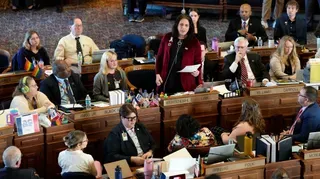April 25, 2014
HIV May Be Manageable But It Ain't Cheap
Kilian Melloy READ TIME: 3 MIN.
Phil Lauderhill takes medications daily to treat his condition. Lauderhill, 36, has been HIV positive for 10 years now, but like most people cannot afford to pay for his treatment alone.
Selzer and Weiss
A food service worker, Lauderhill lives near the poverty line. He relies on the U.S. government's Ryan White Care Act for his treatment. Lauderhill, like all Americans, dreams of independence and liberty and would like to take greater control of his health care.
"I just don't see how I can pay for my HIV meds," he said.
Lauderhill is not alone. Paying for HIV/AIDS treatment is quite a daunting task for those living with the virus. To advocate for those people, the Fair Prices Coalition was formed. An ad hoc group of activists, the Fair Prices Coalition (FPC) is taking on the pharmaceutical industry. The new front in this battle is over Qualified Health Plans, said FPC co-chair Lynda Dee.
"The QHPs mandated by the Affordable Care Act are good news for many people living with HIV and/or hepatitis C, as it means they can't be denied health insurance, because of pre-existing conditions," Dee explained. "This ensures the provision of essential health benefits, including important primary care services, access to specialists, and prescription drug benefits."
"However, many plans are proving financially disastrous for people living HIV, hepatitis C, and other chronic diseases," Dee added.
By disastrous, Dee means, a state can set a minimum standard for their "essential benefits" package that requires only limited coverage of antiretroviral medications and other high cost drug classes.
"This situation is made worse by high drug prices being set and increased annually by manufacturers, along with an inexcusable lack of direction from the U.S. Department of Health and Human Services regarding co-pay assistance programs for people receiving care under ACA-mandated plans," Dee said.
Presently, thirty-three medications have been approved by the U.S. government to fight HIV/AIDS with many more in development. There are five classes of HIV/AIDS medications and the recommendation is for a patient to take three of those drugs in a combination therapy, said Donna Sabatino, a nurse for the Janssen Company.
"Once you start there's no stopping," Sabatino said. "Drug holidays are not happening anymore."
And starting HIV therapy requires money. Jason King, a legislative affairs manager for the AIDS Healthcare Foundation, estimates the cost of medications to be between 10 thousand to 50 thousand dollars per person annually.
The problem, King said, is the system is destined to collapse and options for generic medications are limited.
"There are very few generics and there are people who don't want to take older drugs because there's more toxicity," King said.
Artipla, King said, is the most widely used once-a-day pill used to treat HIV/AIDS. The drug, a multi-class combination pill, is put on the market by Gilead Sciences, Inc. with a $28,500 annual wholesale acquisition price.
"I was on Atripla," Lauderhill said. "I remember having very vivid dreams. Eventually, I decided to take a holiday."
Lauderhill was off medications entirely for nearly three years after consultation with his specialist and a desire to pursue a holistic life. He recently resumed his therapy, taking two pills - Epzicom and Tivicay - once a day. His numbers are great, he says, as the new regimen has reduced the level of HIV in his blood cells to undetectable status.
"The government says you should be undetectable within six months of beginning therapy as prescribed," said Sabatino, who added the new terminology for HIV status is "virus suppressed" as opposed to "undetectable."
The strategy, Sabatino said, is to still hit the virus hard upon diagnosis with the three drug "cocktail."
To do that, patients will need financial assistance as King notes, "nobody pays outright for their drugs." Many of the American pharmaceutical companies have co-pay assistance programs based on income level. Consumers also have the option of purchasing their medications out of the country in places such as Canada or India, although there are legal implications and other risks to consider.
One thing, however, is quite certain in this saga and that is the need to provide affordable options to the 1.1 million people living with the HIV virus in the U.S. King says the Affordable Care Act garnered the support of the pharmaceutical industry by not addressing the rising cost of drugs, which was a primary factor for the legislation's passage. He went on to say the system is running on an unsustainable path due to the rising cost of drugs.
"We are among the few developed nations that do not have a single-payer or universal health system," King said.
Kilian Melloy serves as EDGE Media Network's Associate Arts Editor and Staff Contributor. His professional memberships include the National Lesbian & Gay Journalists Association, the Boston Online Film Critics Association, The Gay and Lesbian Entertainment Critics Association, and the Boston Theater Critics Association's Elliot Norton Awards Committee.






